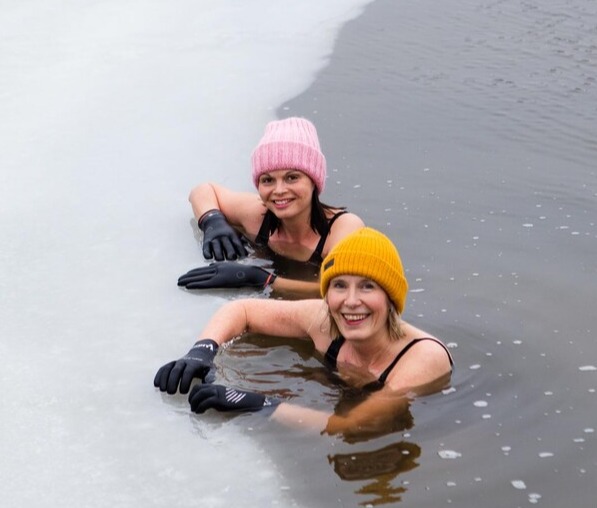Winter swimming is a popular activity in Nordic countries where temperatures can dip well below 20 degrees Celsius. It might seem like an extreme choice for exercise but winter swimming can offer various health benefits such as improved sleep quality, increased production of endorphins, reduced stress hormones, and pain relief.

Although this is well-known among the Finns, the combined effect of psychotherapy and winter swimming in alleviating patients’ mental health disorders has not been previously studied.
Accordingly, Korea Biomedical Review interviewed two Finnish psychotherapists and winter swimming enthusiasts, Riikka Airo and Miia Lehtonen. They said they decided to merge their hobby with their profession to help mental health patients.
“As an increasing number of people are experiencing burnout, depression, and anxiety, we believe this combination therapy provides a promising method for interrupting distressing thoughts and regulating arousal levels without the need for antidepressants which can have various side effects,” said the pair.
In particular, Korea is a country that struggles with mental health, recording the highest suicide rate among OECD countries in 2021 of 26 per 100,000 people and also the highest depression and anxiety rate of 36.8 percent.
Study designed to address 8 different issues
Both Airo and Lehtonen are psychotherapists at their private practice, Terapatiatalo Tunnetila, in Helsinki, Finland. Airo specializes in pregnancy, childbirth, postpartum psychological problems, infertility, and parenting while Lehtonen conducts couples and family psychotherapy.
Inspired by a study conducted in Finland showing the positive effects of cold water swimming, they conducted a pilot study investigating the effects of winter swimming on eight young adults between the ages of 19-28 struggling with moderate mental health problems earlier this year during the winter and spring season, said Airo, mentioning the origins of their pilot study.
The participants were interviewed individually before and after the treatment period to determine the mental health issues they were struggling with at that time. The brief cold water swimming sessions lasted for 30 seconds to 1 minute and were followed by short group therapy sessions. Each session was carried out once per week.
In total, eight group sessions focused on different themes, including confronting fears, recognizing personal boundaries, courage and challenging oneself, mind and body connection, emotions and regulation strategies, self-reflection and self-awareness, acceptance and presence, and calming.
Both explained that they used well-known clinical surveys to measure improvements in patients’ symptoms.
“For example, we used CORE- OM to measure anxiety, Beck’s depression inventory (BDI) for depression, and a visual analogic scale (VAS) for mood,” said the psychotherapists.
Promising results from the pilot study
Following this protocol, participants gave positive feedback at the end of the treatment.
“Overall, we noted improvements in participants' well-being, anxiety, and depression,” reported Lehtonen. “Specifically, based on participants' testimonials, they reported improvements in listening to themselves, a better presence and moments of stillness, and a better connection between the mind and the rest of the body.”
Airo added that it helped patients better understand their personal boundaries.
One participant said, “The ice bath worked well and helped me become more aware of the emotions in my body.”
In an effort to explain the mechanism of action behind the cold water therapy on the patients, Airo replied, “It really is complex and involves various systems in the body, such as the brain related to endorphins and serotonin, hormones, stress response, and the immune system.”
As winter swimming affects various parts of the body, she concluded that a strong rush of endorphins and a sense of presence can help patients get a connection to the mind and body. This in turn can help patients to balance their emotions in a more controlled manner as mental health patients usually suffer from emotional imbalances.
Further research is still needed
Noting that not everyone will have access to swimming lakes as there are in Finland, Airo said, “Similar environments can also be simulated in countries with warmer temperatures or in warmer seasons such as cold water showers or immersions in icebaths.”
On this note, she mentioned that the temperatures that swimmers were immersed in varied from zero to four degrees Celsius. However, other studies have used temperatures ranging from zero to 15 degrees Celsius.
Airo mentioned that cold water therapy is generally safe for everyone, but individuals with specific health conditions, such as heart defects or severe diabetes, may need to avoid it as the shock of the water temperature can negatively impact them. Additionally, intoxicated persons will also not be allowed as this will expose them to a greater risk of drowning.
The project is unique in the world as cold water swimming has not been previously integrated into psychotherapy. As pioneers of this combination therapy, they are planning to apply for funding for a larger study with a control group using physiological measurements.
Outlining future steps, Lehtonen stated, “We plan to use heart rate variability measurements as this represents a more objective indicator which is widely used to measure how well your body recovers from stress in our future studies. We will also like to increase the number of sessions from 8 to 15 in clinical studies to have more data to analyze.”
“The results from our pilot study are quite promising and have convinced us to continue pursuing research in this area so we are currently welcoming funding from interested parties to initiate clinical trials,” said Airo.
Related articles
- Covid-19 left depression and anxiety among under-18s
- Ybrain's MINDD STIM electroceutical alleviates depression symptoms in Covid-19 patients
- AMD patients should be careful of ‘depression’
- Mental health checkup cycle shortened from 10 to 2 years
- ChatGPT vs psychologist. How far has generative AI come?
- Korea to expand mental health projects to lower suicide rate

